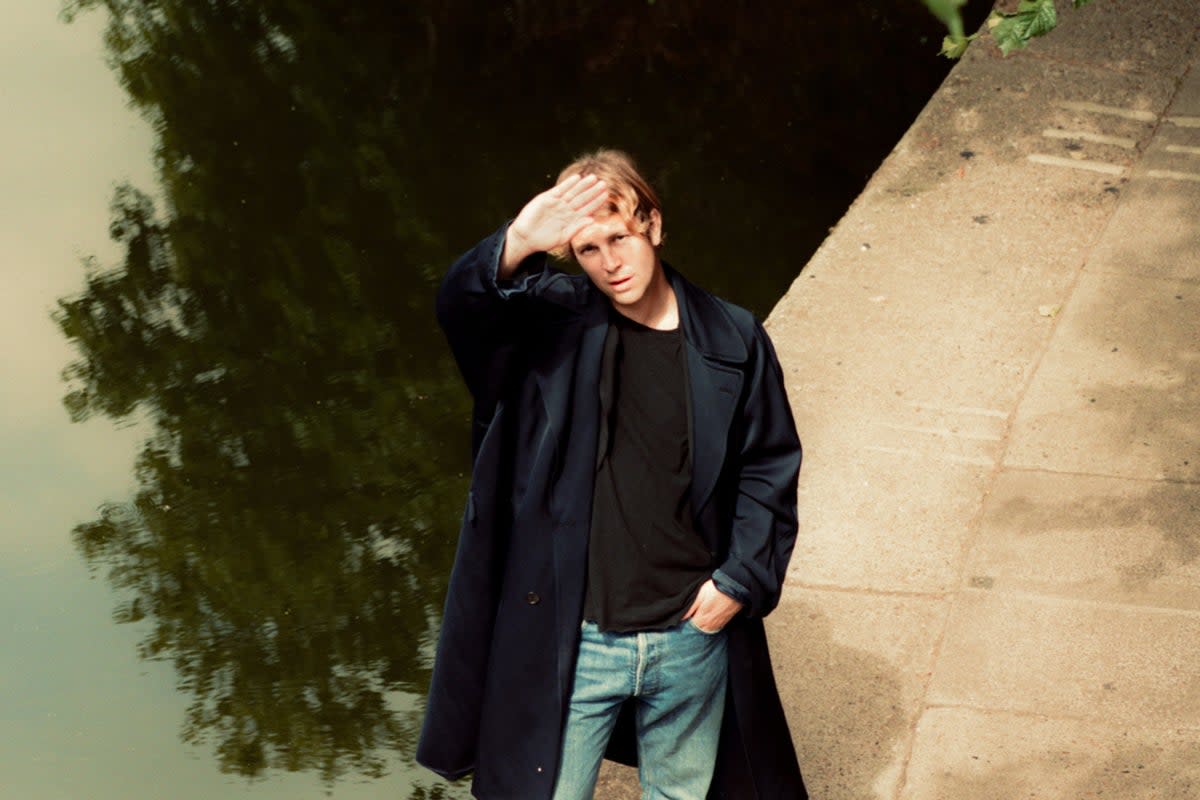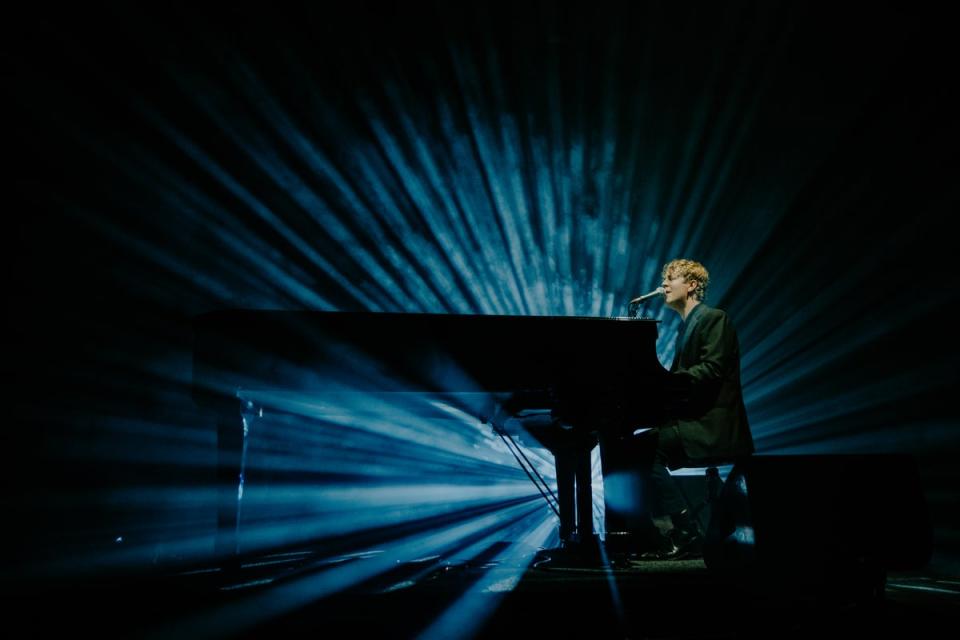Tom Odell talks mental health and Best Day of My Life, his most intimate album yet

“I get so excited when new music comes out each Friday,” Tom Odell exclaims as we sit down for coffee in his east London studio. Today, when we meet, the excitement comes with a sense of pride: the deluge of new music includes twelve tracks from the Ivor Novello-winning singer-songwriter’s latest album, Best Day of My Life. A far cry from the anthemic ballads that propelled him to stardom in 2012, Best Day of My Life is a minimalist masterpiece, and the singer’s most intimate work yet.
The title is a red herring - the new album, like its predecessor, Monsters (2021), is overwhelmingly sad. “When people ask me why I make sad music, I’m always a bit confused,” Odell admits. “How can anyone right now be making anything else?” The flurry of upbeat records released since the end of the pandemic would suggest that some people are in need of more escapist fare; but Odell has always been an unfailingly honest lyricist.
With the same authenticity that lent his heartbroken ballads their strength, Odell now tackles more introspective themes, exploring his deep-seated anxiety that went undiagnosed until 2018 when he was rushed to hospital with a panic attack so severe he was convinced he was having a stroke.
He hopes his new album will give comfort to those suffering in silence, as he once did. Odell becomes quite animated when he talks about it: “There’s an epidemic of sadness and depression among young people. And it doesn’t help that depression and anxiety are framed as personal problems, when they’re so clearly societal,” he says. “It’s not a burden we should ever carry on our own.” He credits his fans with reminding him that he is not alone: “Having a connection there has brought me out of dark moments.”

Originally a poster boy for heartbreak, Odell, who grew up in Chichester, West Sussex, the son of an airline pilot and a primary school teacher, has previously said in interviews that his songs were inspired by an “inability to sustain a relationship with someone for longer than six months.” He’s engaged now, living a settled life in Hackney with his fiancé and their cat.
Still, Odell feels a duty to put enough “rawness and ugliness” into his music to render his struggles in all their difficulty, he says. “When making the album, I kept searching for moments where I would feel uncomfortable.” As a result, the sound of the new record is bare, raw and unforgiving. “It would be remiss of me not to mention that much of it is inspired by minimalism,” he notes, crediting Aphex Twin, Nils Frahm, Philip Glass and Max Richter as influences, none of them known for their jolly ditties.
Best Day of My Life is arranged entirely around voice and piano. “I got this one at an auction in Conway Hall five years ago,” Odell says, gesturing towards a humble wooden piano in the corner of the room. He admits to neglecting the instrument until it was moved into his new studio this year. Using the protective rugs left by the movers, Odell placed them over the soundboard to cushion the notes and create a more muted effect. “It feels cold and removed,” he explains while playing arpeggios.
The piano has been at the heart of Odell’s love story with music, often confounding producers unable to fathom his desire to put it at the heart of every track. He started playing aged seven, inspired by his older sister who was getting lessons. By nine, he’d started composing. After playing with a band at school and attending the British and Irish Modern Music Institute in Brighton, Odell moved to London to pursue a solo career, the piano anchoring his work at every step. His sound grew grander and closer to his most influential childhood record: Elton John’s Goodbye Yellow Brick Road, also the first he ever owned.
Odell’s lyrics, like his voice, find power in restraint. On Sad Anymore, he repeats the same simple line over and over again. “It felt rebellious,” he explains, for someone who grew up on “an appetite of songwriting” and remains enamoured by “the greats”: Leonard Cohen, Joni Mitchell, Bob Dylan. Breaking with the conventions he’d inherited allowed him to find the moments of abrasion that make his new record so compelling. For the pithy Giving A F***, Odell wrote endless drafts before finally settling on the rawest and angriest verse. “As an artist I have a duty to be honest and real.”
Odell knows that the music is at its most powerful when it expresses an inarticulable emotion; he likens this to “an outstretched hand, alleviating loneliness.” And then there are the feelings that only music can express; on Just Another Thing We Don’t Talk About, the songwriter reveals his own failure to reach out and be vulnerable with his loved ones.
He is scathing about the current climate of endless social media noise: “I truly believe the most punk and anarchistic thing you can do right now is not give your immediate reaction to something,” he says, explaining that he wants to inspire a space of empathy for listeners to enjoy his record, removed from the constant inundation.
But alongside the deluge of attention-grabbing opinions, there are also aspects of social media that Odell admires. He praises online communities for creating a space of comfort and understanding for so many. A keen advocate for compassion, he signed an open letter in 2020 to Liz Truss – then UK Equalities Minister – calling for a ban on gay conversion therapy, alongside Dua Lipa, Elton John and Sam Fender.

Separately, he is also full of praise for contemporary music. “Pop is way more exciting now than it was when I started out,” he smiles, “and streaming’s allowed for a more diverse set of artists to be heard.”
Thanks to streaming, radio executives that used to dictate a track’s popularity have become all but obsolete. The absence of gatekeepers means we get a more accurate picture of what people truly want to listen to: right now that seems to be music that is less filtered and more authentic. Even commercial artists are no longer so excessively packaged, Odell says, quoting from Billie Eilish’s recent single The 30th.
The singer admits he used to gatekeep his own music, scrutinising records ahead of their release and fretting over them. “You have to learn to let them go,” he sighs. It’s something he’s finding easier to do with Best Day of My Life. “I’m really quite proud of it,” he laughs, aware of how offbeat his delight sounds following a long chat about depression. After an hour together I’m only too happy to see this man, whose humility belies his talent, positively beaming. Best Day of My Life may not be Tom Odell at his most popular or commercial; but it’s Tom Odell at his truest and most important, and he knows it.
Best Day of My Life (Banquet Records) is out now

 Yahoo News
Yahoo News 
